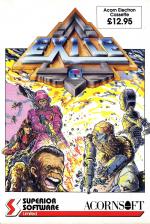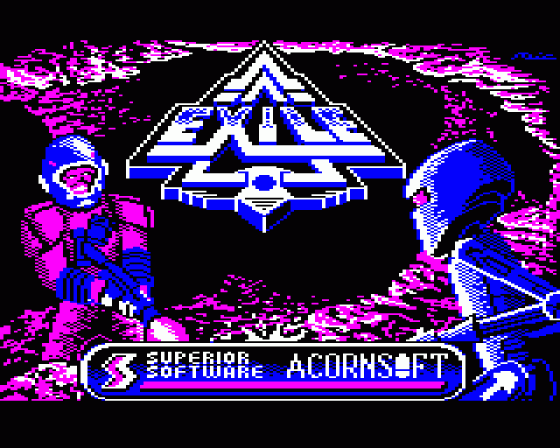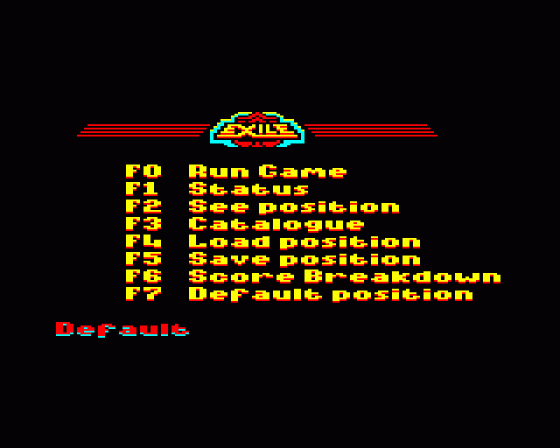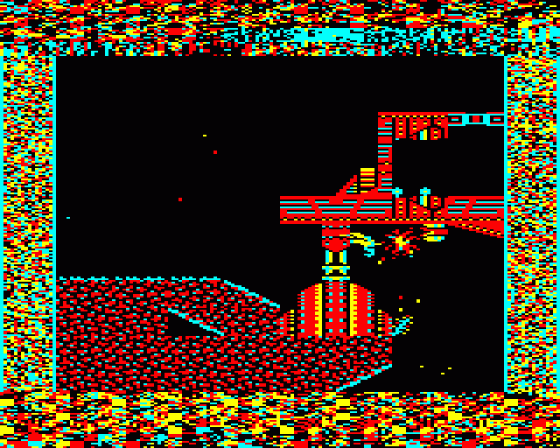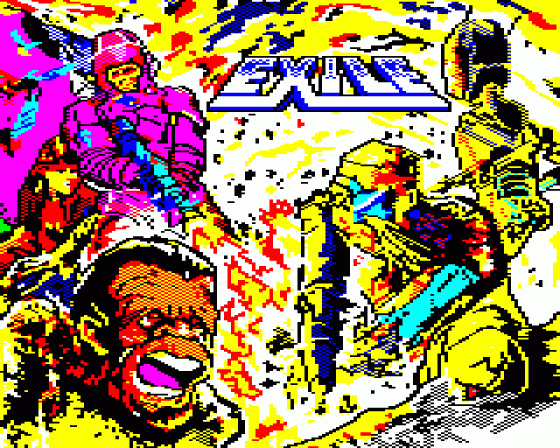
EUG PD
 1st November 2001
1st November 2001
EXILE Comes To Disc At Last!
One of the most wonderful developments in breathing new life into a classic of the Electron age is a 'new' ADFS version of Exile for an Elk with the official Acorn Plus 3. As we all know, discs for the upgrade that eats a substantial amount of memory are few and far between. That master coder Simon Irvin has managed to port Exile, a game so large it takes over fifteen minutes to load from tape and has separate programs for options and saved positions, to this format is literally staggering!
No Introduction Needed
Exile will need little introduction to many as it is simply the most talked about game in the 8bit world. Still available on cassette from Superior/Acornsoft to this day, the game is housed in a swish black plastic case and accompanied by a glossy novella, a user guide and a diagram of keyboard controls. As with the "companion" titles Elite and Repton Infinity, similarly cased and in the Superior £12.95 series, the cover art is also in a league of its own. Glowing quotes from the Acorn press adorn its back cover - playing the game very much proves it the exception to the "Don't believe their own publicity" adage. You can believe everything you read about this one [Except the bad write-up in Electron User! - Ed] and even the 16-bit world shouted out for, and got, their own conversion.
Finn-ish Him!
Tackling the package in the most professional sense means first reading Mark Cullen's entertaining and atmospheric account of a mission to a hitherto unexplored planet many years in the future. Here you'll discover that the "exile" of the title is a legal punishment for severe felony and that, for quite some time previously, madmen unsuitable to live in a civilised community were sentenced to a one-way trip away from Earth and into space. No prizes for guessing that one madman earlier crash-landed on this planet instead and, when the crew of the "Pericles' mission" arrive, he seizes his chance to obliterate them, tool up their ship and prepare to return to Earth again. Not before a lot of double-dealing and emergency broadcasts have been radioed out to Mike Finn, in orbit around a nearby planet, though.
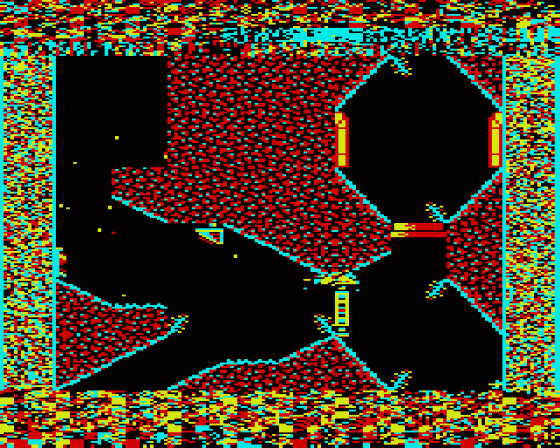
The game Exile begins as Finn's spaceship enters Phoebus' atmosphere and madman Triax teleports in and steals the 'Destinator', the equipment that powers the craft. You actually see this commendable little sequence on screen and can even make a vain attempt to stop it. Triax is 'destined' [Groan! - Ed] though to get away with his theft, leaving you, as Finn, floating aimlessly in space and completely to your own devices.
Gravitational Pull
The action is viewed from the side-on angle familiar in platform games but, on beginning to move Finn left and right, you will notice that he stays almost centre-screen the whole time while the environment scrolls around him. The Electron version suffers from a very jerky, and somewhat slow, scrolling effect on occasion (much improved with a Turbo Board fitted), has a much smaller area of what surrounds Finn shown than the BBC machines and is bordered on all sides by 'rubbish' (important binary information which has no other place to be stored than on-screen, such is the size of the game).
This is not to say that the movement routines are not fantastic. Gravity pulls Finn down onto the floor of his craft. When you headbutt a button and the airlock opens, Finn falls toward the planet surface. Touch a key and his body 'rolls'; lying down, straightening up, turning around and twisting to face where he's headed. Thrust with the jetpack and you'll see microns emitted from his tail-end and 'feel' the resistance as the falling comes to a halt and then is converted to ascent.
A Living, Breathing Planet
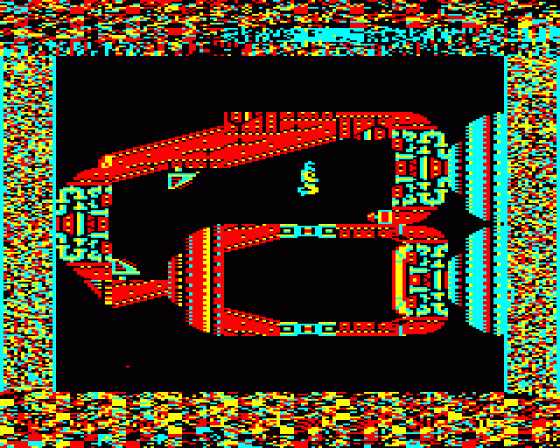
The exploration will quickly reveal the size of Phoebus which is a remarkable factor considering the memory size of the Elk. The planet is tens of thousands of times bigger than the area you see on screen, and home to many species of mutated lifeforms. Killer birds, robots, bees, maggots, warriors and fireballs are just some of the monstrosities living their independent existences in the caverns below the surface - and their response to strangers is usually attack. This is what gives the game immense addictiveness. You descend onto a living, breathing planet which is carrying on a daily existence. There's no time limit on your mission: you can move, and do, whatever you want and puzzles, and items you can pick up and use, can be handled in many different ways.
Due to the futuristic technology of his spacesuit, Finn will never be killed, even by Triax (who occasionally shows up to wage war against you if you have completed a certain obstacle). Instead, if he is losing power very quickly, he will be 'transported' either (and ultimately) to his spacecraft above Phoebus, or to the first of four 'remembered' positions. Navigating the caverns necessitates such remembering and teleporting on many occasions. Before flying into extreme danger, you press "R" in a 'safe' place. If your plans go belly-up, you press "T" and try again.
The game is cleverly rendered in Mode 5 so is as perky and colourful as you could ever hope. Finn meets up with friendly as well as fiendish characters and, although the game is truly awesome in its proportions, it cleverly restricts you to certain areas at the outset so that you can get the 'feel' of how to play it without being overawed. As you discover more and more, you grow stronger and stronger through the guns and bodysuit enhancers you pick up. You can even aim at any angle - and there are realistic bleeps, despite the Elk's limited capacity for sound.
But... How?
For many years, incredulous 8bit gamers have asked "How was it done with just 32K?" of Exile. What's even more baffling of course is how Simon Irvin's disc version manages the same with just 28.5K! Two things which may provide some answer are (a) that the disc version has stripped out the copy protection procedure that asks for a random word from the novella before play commences, and (b) that the disc interface is poked directly through a mass of extra machine code that has been put in.
These inclusions have had the unfortunate effect of making the disc version of Exile only compatible with the original L-shaped Acorn Plus 3 expansion and it will not work with the later ACP variants: i.e. AP3 or AP4. If you consider Exile too slow without a Turbo Board, this means you do really need the specialist equipment of a 'Turbo'ed Elk and the Acorn Plus 3 to make full use of this new disc version. But there's no denying it's worth getting these just to marvel at its existence!
Scores
Acorn Electron Version| Graphics | 97% |
| Sound | 78% |
| Playability | 100% |
| Lastability | 100% |
| Overall | 94% |

